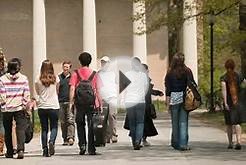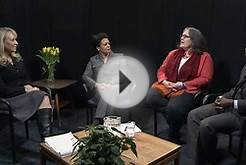A blog linked to a well-known academic journal is facing pressure to remove a recent post arguing that the secular political left increasingly seems to sympathize with Islamic jihadists. The site’s editors say they’re confused, and are waiting for clarification on just what’s wrong with the piece.
“Political Theology is arguably the best-known journal in the field, ” wrote a group of nine scholars working in the field of political theology to the editors of the journal’s blog, “Political Theology Today.” “To have such a speciously argued right-wing hit piece - which does not cite a single secular leftist who actually supports jihadist ideology - associated with such an important outlet is an embarrassment and a disgrace.”
The post in question was written by Martin Katchen, an independent scholar who writes about international affairs, religion and politics. It argues that some liberals have abandoned their core beliefs in expressing support for aspects of what Katchen calls “Islamist thinking.”
“One of the more difficult things to explain about the behavior of the political left in the West has been their increasing apology for Islamist thinking, or at least their indifference to its consequences, ” he wrote. “It makes little sense to outside observers why and how people on this end of the political spectrum can find themselves sympathizing with ideologies that treat women, according to their own historical rhetoric, as second-class citizens.”
Katchen goes on to argue that “the cause of Salafist Islam has come to dominate the field of armed struggle since 2001 and to be the most attractive option for people inclined to practice insurgency.” Such a cause “melds well with the lessons in insurgency and terrorism previously taught by Marxist theoreticians such as Carlos Marighella, especially when one factors in the ideas and strategy” of some modern Islamist theorists, he said.
So such concepts appeal to many on the “radical left” in the West, he continued, “who may go so far as to be motivated by the melding of a theory of armed revolution with an intact religious tradition, thereby even converting to Islam. It may also mean that support for jihad, particularly in Europe, may go well beyond Muslim enclaves.”
Arguing that such tendencies have “driven many who would otherwise be sympathetic to the left agenda and who are concerned with social justice and equality to take refuge in the right, ” Katchen concludes that it’s time for a new, “nonauthoritarian left” to balance out and provide a “loyal alternative and opposition to a neoliberalism that has become a dogma that increasingly is used to justify the economic and increasingly political and social repression of poorer classes and the concentration of wealth and income in fewer and fewer hands.”
Radical jihadism “otherwise may be the only option, ” he wrote.
Katchen’s piece is certainly provocative, and many on the left and right would probably take issue with his assertions. But in their letter to “Political Theology Today, ” the group of international scholars wrote that Katchen’s thoughts were “dangerous.” They also point out that Katchen's post itself doesn't name any examples of Western leftist thinkers who sympathize with jihad.
“Within a context of burgeoning Islamophobic policies, practices and attitudes within Western countries, it is dangerous, ” they wrote. “We demand that the post be removed and an apology posted, and that the editorial process for the blog be reviewed to avoid such poor judgment in the future.”
The editors of “Political Theology Today” responded to the letter by saying that neither the journal nor the blog endorse or “necessarily agree with the opinions expressed by our contributors. Sometimes we even vehemently disagree. But in keeping with our policy of open and free discussion of timely matters, we allow for a wide range of views on different sides of the political spectrum, especially for unsolicited pieces (as this one was).”
The editors said that they welcome diverse perspectives but “are careful to avoid posts that are clearly defamatory or disparaging to particular religious or ethnic groups.” And while they said they welcomed further dialogue on the Katchen piece and other matters, it didn’t appear that his piece violated practices and policies, they wrote.
A copy of the scholars’ letter soon appeared on the humanities blog “An und für sich” with the note, “The editorial board of [‘An und für sich’] sent the following letter privately to the editors of the journal. We are now posting it publicly in the hope of spurring action.”
Adam Kotsko, an assistant professor of humanities at Shimer College and one the scholars demanding that the blog post come down, said via email that they went public because their concerns had met such an “evasive” response. Katchen’s piece rests on a guilt-by-association logic and negative stereotypes about Islam, he said, and does not include a “single instance of a secular leftist directly saying that jihad is a good thing or an idea worth supporting.” He called it “a disgrace.”
Katchen could not immediately be reached for comment. Carl Raschke, a professor of religious studies at the University of Denver and managing editor at “Political Theology Today, ” said it was still unclear to him and his colleagues what was fundamentally objectionable about Katchen’s piece, since it was a blog post - not a peer-reviewed journal article - and dealt with questions of (radical) Islamism, not Islam as a whole.











